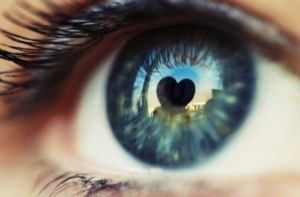
Ahh, Valentine’s Day. Love is in the air. And while you’re probably busy planning the perfect romantic dinner or sending a few dozen roses to your sweetie’s office causing extreme jealousy from fellow co-workers, we want to remind you of another crucial long-term relationship in your life – your EYES! That’s right, showing your eyes some love will ensure your vision stays healthy for decades to come. Take a look below at some of the foremost ways to keep your vision sharp and your eyes in top-notch shape.
1. Eat a healthy, well-balanced diet.
We’ve all been told carrots are good for your eyes. But don’t discount all other fruits and vegetables too – especially dark, leafy greens like spinach and kale. Plan a meal with fish that’s high in omega-3 fatty acids, like tuna or salmon, to get even more healthy vision benefits.
2. Get a comprehensive dilated eye exam.
The only way to make sure your eyes are truly healthy is through a comprehensive dilated eye exam. Many serious eye diseases, like glaucoma, age-related macular degeneration, and diabetic eye disease are actually very common and can only be found through a dilated eye exam.
Call us to schedule your annual eye exam with one of our optometrists, or schedule your appointment online.
3. Pamper Your Eyes.
Every now and then, even your eyes need to be pampered a bit. Using a cool cloth, cucumber slices, or even chilled teaspoons can help reduce puffiness, swelling, dark circles and blood flow to your eyes alleviating swelling and giving you a refreshed view on life!
4. Maintain a healthy weight.
A well-balanced diet can also help you maintain a healthy weight. Obesity and being overweight can increase your risk of developing diabetes and other conditions that can cause vision loss, including glaucoma.
5. Quit smoking.
If you haven’t heard by now, smoking is bad for your health – including your eye health. According to the National Eye Institute, “research has linked smoking to an increased risk of developing age-related macular degeneration, cataract, and optic nerve damage, all of which can lead to blindness.”
6. Learn about your family’s vision history.
Your family’s history of eye disease can be an indicator for your own vision health. Ask around and keep a record of any problems or diseases to share with your doctor in your next eye exam.
7. Protect your eyes.
Wearing protective eyewear in the workplace or while doing hazardous activities, like certain sports, is crucial to protecting your vision. Safety goggles are typically made of polycarbonate, which is many times stronger than regular plastic. Check with your doctor to make sure you’re taking all of the necessary precautions to keep your vision intact.
8. Shade Your Eyes.
Blocking the sun’s harmful UV rays is sunglasses main purpose (aside from making you look fabulous). All of our sunglasses block 100% of UVA and UVB rays, which are the most harmful and is the amount of protection you should always look for in sunglasses.
9. Keep it clean.
When handling your contact lenses, always wash your hands thoroughly. Also, make sure to replace and disinfect contact lenses as often as directed.
10. Rest Your Eyes.
Living in a digital world means your eyes get a lot of screen time. From cell phones to TVs to computers, more than 87% of Americans report using digital devices for more than two hours per day, according to The Vision Council. Extended use can cause eye strain, which can lead to dry eyes, headaches, blurred vision, and neck and shoulder pain. Take frequent breaks from your screen by using the 20-20-20 rule: take a 20-second break from the screen every 20 minutes by looking at something 20 feet away.



